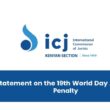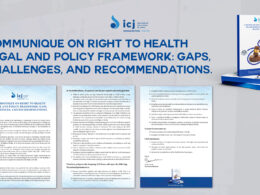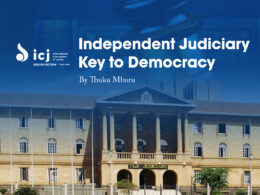By Joanne Mutonga
In the final part of ICJ Kenya three-part series, ICJ Kenya Programme Officer Joanne Mutonga discusses on the abolition of death penalty as a national movement and the Case of Francis Murutatetu versus the Republic of Kenya.
As the regional and global community intensified its efforts on the abolition of the death penalty, the abolition campaign was taking its roots at the national level. In Kenya the campaign on the death penalty was largely spearheaded by civil society organizations such as the Kenya Section of the International Commission of Jurists, Amnesty International, KATIBA. The progress made at the regional and global stage largely influenced the clamor for the abolition of the death penalty in Kenya.
In August,2010, the Republic of Kenya promulgated the Constitution of Kenya, 2010. The Constitution significantly reconfigured Kenya’s trajectory on human rights and the rule of law including a paradigm shift from a dualist to monist State. To this end, international treaty instruments became part of Kenya’s legislation. This proffered a good starting point for the abolitionist movement in Kenya to the extent that Kenya was bound by the customary norms of international law upon ratification. Some of the instruments to which Kenya is a State party are: The United Nations Declaration on Human Rights[1], International Covenant on Civil and Political Rights[2], The Convention against Torture and Other Cruel, Inhuman or Degrading Treatment or Punishment[3], The Convention on the Rights of the Child and the African Charter on the Rights and Welfare of the Child[4], The African Charter on Human and Peoples Rights.[5]It is noteworthy that Kenya is not a party to the Second Optional Protocol to the International Covenant on Civil and Political Rights which expressly prohibits the use of the death penalty as punishment and provides that, “ no one within the jurisdiction of a State Party to the Protocol shall be executed10 and that each State Party shall take all necessary measures to abolish the Death Penalty within its jurisdiction.[6]In this regard, the Republic of Kenya, has no obligation under the Convention to abolish the death penalty.
Although Kenya has not ratified the Second Optional Protocol to the International
Covenant on Civil and Political Rights, the Protocol on the Abolition of the Death Penalty in Africa and abstained from voting on the UN mortarium resolution of 2010, the death penalty has been abolished in practice with the last execution being handed down in 1987. This then makes Kenya a de facto abolitionist State.
Towards this end, Kenya positive steps have been taken to release death row inmates. In August 2009, former President Mwai Kibaki commuted the death sentences of the more than 4,000 prisoners who were on death row. In 2016, his predecessor, President Uhuru Kenyatta, commuted the death sentences of all 2,747 prisoners on the nation’s death row being 2,655 men and 92 women.
In 2017, the Supreme Court issued a landmark decision declaring the mandatory death penalty sentence as, “unconstitutional” and out of sync with the Bill of Rights as enshrined in the Constitution of Kenya, 2010. This landmark decision has been instrumental in not only the clamor for policy and legal reforms to the extent of repealing sections on the death penalty but it has also triggered the development of a new body of jurisprudence as will be espoused below.
- Francis Murutatetu v Republic of Kenya: Implementation and Application
- Administrative Implementation
In 2018, The Task Force on the review of the mandatory nature of the death penalty in Kenya delivered its report setting out a guiding framework on the implementation of the Supreme Court’s decision in the Francis Murutatetu Case. Some of the key recommendations set out in the report include re-sentencing of the following categories of offenders: all offenders on death row as at the time of the decision; all capital offenders whose sentence had been commuted to life imprisonment; and any offenders sentenced to death after the decision in Murutatetu but without regard to or compliance with the court’s declaration and who have exhausted all appeal mechanisms.
Four years on there has not been significant progress made towards not only implementation of the Task force report findings but also formalising the State’s commitment to abolish the death penalty. More specifically, the National Assembly is yet to repeal of the five sections of the Penal Code which provide for the death penalty as a sentence, the government through its relevant agencies is yet to issue a formal moratorium on the application of the death penalty further to ratifying the Second Optional Protocol to the International Covenant on Civil and Political Rights (ICCPR). There still lacks harmonisation of the sentences meted out in capital offences particularly following the issuance of the Supreme Court guidelines limiting the application of the Francis Murutatetu decision to Murder cases only. Additionally, provision for legal aid for indigent persons on death row remains a challenge with minimal financial and human resources necessary to ensure legal assistance at all stages of the trial process.
- Judicial Interpretation
The Supreme Court judgement was lauded as a positive development to the abolition of the death penalty campaign as it propelled the wheels of policy and legal reform. The decision was not only welcomed by abolitionist proponents but also by persons who sought to challenge the mandatory sentences and mandatory minimums. One such Case would be the Case of David Esokon Samwel v Republic [7]where the court in analysing the application of the Murutatetu decision held that, “the Murutatetu decision applies mutatis mutandis to the provisions of Section 8(2) of the Sexual Offences Act which imposes the mandatory life imprisonment for the offence of defilement.” The Court resentenced the Petitioner- accused for defilement- from life imprisonment to a twenty-year sentence. Similarly, the application of Murutatetu decision in sexual offences under the Sexual Offences Act No. 6 of 2003 was considered and applied by the Court of Appeal in Dismas Wafula Kilwake v R [8], where the court held that the mandatory minimum sentence under Section 8 of the Sexual Offences Act was unconstitutional as it denies the court discretion in sentencing. This was the similar approach taken by the Court in the Cases of Jared Koita Injiri v Republic and the Case of Julius Mlanda Wanje v Republic where the Murutatetu decision was applied in sexual offences challenging the mandatory minimums. However, the question that emerged was whether the application of the Murutatetu decision -where the facts and circumstances of the case were dissimilar- was applicable in all cases or not?
- The Supreme Court Guidelines on Application of the Murutatetu Decision: At a glance
On 6th July, 2021, the Supreme Court dissatisfied with the manner with which the Murutatetu decision was being applied and interpreted by the lower courts observed that, “ While it is regrettable that the report was not filed timeously and these directions not issued immediately, there can be no justification for courts below us, to take the course that has now resulted in the pitiable state of incertitude and incoherence in the sentencing framework in the country, giving rise to an avalanche of applications for
re-sentencing. Appellants whose sentences were confirmed by the High Court and the Court of Appeal have returned to the magistrate’s courts, where, without reference to the decisions of the two superior courts, have had those sentences revised. The magistrate’s courts have also, in some instances entertained applications for re- sentencing in murder cases, clearly without jurisdiction. Likewise, some Appellants
whose appeals under various statutes prescribing mandatory or minimum sentences, that they are pending hearing and determination, either in the High Court or the Court of Appeal, have also had their sentences revised by the magistrate’s courts without disclosing the fact that pending appeals exist in the superior.” The Supreme Court then issued directions and guidelines to the effect that the decision in Murutatetu was only applicable in respect to sentences of murder under section 203 and 204 of the Penal Code.
These guidelines and directions were received with discontentment in some quarters arguing that it watered down the gains of the SC decision whilst for others it brought forth more clarity particularly as it relates to the applicability and interpretation of the judicial doctrine of precedence.
- In Focus: The Case of Francis Murutatetu v the Republic of Kenya
The petitioners –Francis Karioko Murutatetu and Wilson Thirimbu Mwangi – were arraigned before the High Court for the offence of murder contrary to section 203 read with section 204 of the Penal Code. They were convicted and sentenced to death in tandem with section 204 of the Penal Code. They appealed both the conviction and sentenced to the Court of Appeal on the grounds that the mandatory death sentence imposed upon them and the commutation of that sentence by an administrative fiat to life imprisonment were both unconstitutional and therefore null and void. The Appeal generated a lot of national and international interest. ICJ Kenya together with other civil society organizations were admitted as amicus curiae in the Case to providing guidance to the Court on the, “Compatibility of the mandatory death penalty with the Constitution.”
The Petitioners argued that the mandatory nature of the death penalty under Section 204 of the Penal Code fettered the judicial discretion compelling it to hand down pre-determined sentences as imposed by the Legislature thus impeding the doctrine of separation of powers. In their arguments, the Petitioners relied on the decision rendered in the Case of Francis Kafantayeni & 5 Others v the Attorney General [in which the Constitutional Court stated that, “sentencing was a legal issue that formed part of the principle of fair trial and required judicial determination in the course of a trial and could not be achieved by a legislative fiat. In the circumstances, the imposition of the mandatory death sentence which denied the convicted person an opportunity to seek review from a higher Court amounted to inhuman treatment or punishment.”[9]
The Petitioners, also argued that the mandatory nature of the death sentence was a violation of the right to a fair hearing under Article 50 (2) (q) of the Constitution relying on the Court’s observations in Godfrey Ngotho Mutiso v Republic where the Court stated that, “A uniform sentence denies courts the chance of considering mitigating circumstances and fails to appreciate that sometimes there may be unequal participation in a crime which would result to different charges and sentences on the accused persons[10].
Lastly the Petitioners invoked the Court to overturn the decision rendered by the Appellate Court in Mwaura & 2 others v R, [11] on the grounds that the said Court failed to find that the mandatory nature of the death sentence set out in Section 204 of the Penal Code as unconstitutional contending that, “only a valid sentence in law can be commuted by the President of the Republic.” To this end the Petitioners invited invoked the Court to issue riders to the effect of commutation of the death sentence to life imprisonment.
The Respondents in unforeseen turn of events concurred with the Petitioners arguments relying on decision rendered in Joseph Kaberia Kahinga and Others v The Attorney-General[12], in which the Court determined that, “it would amount to the violation of accused persons’ right to fair trial as provided under Article 50 (2) of the Constitution if the Court does not receive and consider mitigating factors and other statutory and policy pre-sentencing requirements.” The Respondent went further to asserted the need for the matter to be referred back to the High Court emphasizing that the Petitioners would be accorded an opportunity to argue their case.
ICJ Kenya in their amicus brief argued that the mandatory death penalty was a blatant violation of international human rights instruments to which Kenya has ratified and therefore bound to adhere by virtue of Article 2(5) and Article 6 of the Constitution of Kenya. ICJ Kenya while relying on the provisions of Constitution argued that the mandatory death penalty was a violation of the freedom from cruel, inhuman, and degrading treatment, the rights to a fair trial [13]and the doctrine of separation of powers articulated in Chapters 9, 10, and 11 of the Constitution. Heavily relying on the experiences from Uganda and Malawi, where the mandatory death penalty had most recently been abolished, ICJ Kenya concurred with the Petitioners on the need to declare the mandatory death penalty, “Unconstitutional.”
The six-judge bench in applying itself to the matter which had been a subject of contention before the lower courts, and acknowledging the decisions rendered by various jurisdictions both at the reginal and international level observed that the Section 204 was a violation of the right to fair trial in that “
Section 204 of the Penal Code which provides for a mandatory death sentence is antithetical to the Constitutional provisions on protection against inhuman or degrading punishment or treatment and fair trial. The Court noted that, “while the Constitution itself recognizes the death penalty as being lawful, it does not say anywhere that when a conviction for murder is recorded, only the death sentence shall be imposed. Having assessed its findings the Court declared that, “Section 204 shall, to the extent it provides that the death penalty is the only sentence in respect of the crime of murder is inconsistent with the letter and spirit of the Constitution, which as we have said, makes no such mandatory provision.”[14]
The Court went ahead and faulted the decision rendered in the Case of Geoffrey Mutiso v Republic stating that, “the Appealte’s decision was per incuriam [15]in so far as it purported to grant discretion in sentencing with regard to capital offences.”
The Supreme Court went ahead and interrogated the provisions of section 204 of the Penal Code which provided that, ‘Any person convicted of murder shall be sentenced to death.” In its interrogation the Court observed that Section 204 the Penal Code restricted an Accused’s person opportunity to mitigate since the court has to impose the death sentence nonetheless. The Court further added that that, “a person facing the death sentence is most deserving to be heard in mitigation because of the finality of the sentence.” Additionally, the Court invoked the provision of Article 4 of the ICCPR which provides that All persons shall be equal before the courts and tribunals. In the determination of any criminal charge against him, or of his rights and obligations in a suit at law, everyone shall be entitled to a fair and public hearing by a competent, independent and impartial tribunal established by law…”
As relates to the question whether Section 204 of the Penal Code deprived off the judiciary its powers to sentence Accused persons, the Court observed that the wording of the provision limited the exercise of judicial discretion in sentencing and further stated that, Where a court listens to mitigating circumstances but has, nonetheless, to impose a set sentence, the sentence imposed fails to conform to the tenets of fair trial that accrue to accused persons under Articles 25 of the Constitution; an absolute right.”
The Court in its Judgement declared the mandatory nature of the death sentence as provided for under Section 204 of the Penal Code is hereby declared unconstitutional and issued orders for the establishment of a framework to deal with the sentence re-hearing of the applicable cases and lastly directed the legislative making bodies to enact legislation to the effect of repealing sections that made provision for the death penalty.
-THE END-
[1] Adopted in 1948
[2] Acceded to on 23rd March 1976.
[3] Acceded to on 23rd March 1997
[4] Ratified on 2nd September 1990
[5] Acceded to on 23rd January 1992.
[6] https://www.biicl.org/files/2196_country_report_kenya_ asiema.pdf
[7] David Esokon Samwel v Republic (2020] eKLR
[8] Dismas Wafula Kilwake v Republic [2018] eKLR,
[9] Francis Kafantayeni & 5 Others v the Attorney General [2007] MWHC1, 9.
[10] Godfrey Ngotho Mutiso v R, Cr. App No. 17 of 2008
[11] Mwaura & 2 others v Republic in Criminal Appeal, No. 5 of 2008
[12] Joseph Kaberia Kahinga and Others v The Attorney-General, Constitutional Petition No. 680 of 2010, [2016] eKLR.
[13] Article 50
[14] Francis Murutatetu v Republic of Kenya
[15] Per incuriam means, “characterized by lack of due regard to the law or the facts.”












